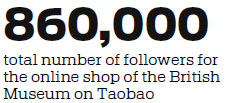Overseas firms take the online route for growth
Apart from the well-known Chinese museum intellectual property, some established foreign IPs have also found the Chinese culture and art market promising.
From T-shirts printed with an adorable version of the Gayer-Anderson Cat to aprons inspired by the Book of the Dead of Hunefer from ancient Egypt, for any museum savvy person, the British Museum's souvenir shop is always a delight to conclude a careful exploration of one of the best museums in the world.
However, not everyone in China has the luxury of being able to visit the museum in person when they want. But they can have easy access to the museum's IP products through Taobao since it started an online shop on the platform last July.
After a year, the shop has more than 860,000 followers and over 100 products ranging from a 6 yuan (85 US cents) file holder to 1,999 yuan worth of sculptures.
He Yizan, CEO of Alfilo Brands, a Shanghai-based consumer products company that holds licensing rights to a number of the world's leading art, cultural, fashion and entertainment properties, including the British Museum, said to begin with, the cultural and creative products of museums were mainly stationery, but now there was a wider variety of products available.
Just like any other products, the development of such products was made after careful research and analysis.

"First of all, we will make a list of all the collections in the museum that are suitable for the market and then we will make models out of the patterns and images of such relics," said Sun Yun, director of IP development of Alfilo. "Then we will make a list of what the trends will be based on data and marketing research six months ahead."
Apart from the British Museum, Alfilo Brands is also developing a number of Western museum brands for Chinese audiences including the Metropolitan Museum of Art, which launched its Taobao shop this year.
"A country's economy decides how advanced its fashion industry is," said Wei Pengju, director of the institute of cultural economics at the Beijing-based Central University of Finance and Economics.
"After years of development, China's per capita GDP is about $10,000 per capita, and it is the best time for the country to develop its culture industry," he said.
(China Daily Global 08/30/2019 page10)


















